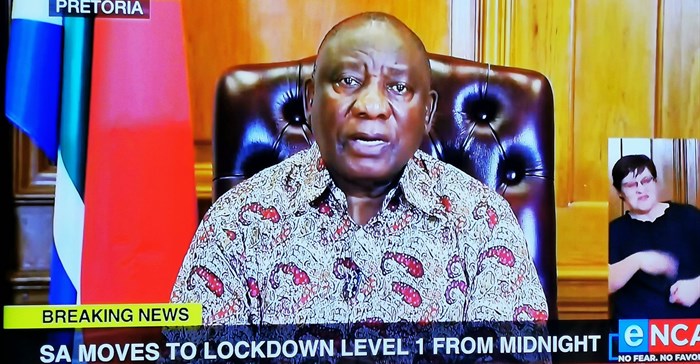SA on Adjusted Alert Level 1

Anounced last night by President Ramaphosa when he addressed the nation, the president confirmed that country has emerged from its Covid-19 third wave - which lasted more than 130 days - about two weeks longer than each of the earlier waves. “This wave, which was driven by the Delta variant, was far more severe than the previous two waves,” said Ramaphosa. South Africa has moved from 20,000 new cases a day to 1,800 a day on average. Covid-19 hospitalisations and deaths have decrease nationwide.Vaccination driveTo date over 17 million vaccine doses have been administrated and over 8.6 million people fully vaccinated. This is more than a fifth of the population."Since we launched our national vaccination drive, it has been gathering pace," says the president. However, Ramaphosa says while the country has secured sufficient vaccine doses for the target population, the vaccination programme is still too slow. If government can vaccinate 70% of the population it means saving up to 20,000 lives. “That represents 20,000 people – mothers, fathers, sons and daughters – whose death can be prevented if the majority of us chooses to get vaccinated,” says Ramaphosa. To achieve this, government will need to administer an additional 16 million vaccine doses this year - around 250,000 first dose vaccinations every single workday of every week until mid-December. To ramp up the vaccination campaign, the ‘Vooma Vaccination Weekends’ campaign, a countrywide drive to encourage people to get vaccinated, launches this weekend to reach over half a million people. This is especially targeted to people who cannot get to a vaccination site during weekdays. Ramaphosa also called on businesses to facilitate the vaccination of their workers and encourage their workers to get vaccinated.The president confirmed that Department of Health will soon be rolling out a vaccination certificate, which will provide a secure and verifiable proof of vaccination, and be usedto travel, access establishments and gatherings and other forms of activity that require proof of vaccination status. Adjusted Alert Level 1The president announce that the country would move from Adjusted Alert Level 2 to Adjusted Alert Level 1 from midnight tonight. The following measures will apply as part of Alert Level 1:
- The hours of the curfew will change, from 12 midnight to 4am.
- Non-essential establishments like restaurants, bars and fitness centres will need to close by 11 pm to allow their employees and patrons to travel home before the start of the curfew.
- The maximum number of people permitted to gather indoors will increase from 250 to 750, and the maximum number of people permitted to gather outdoors will increase from 500 to 2,000.
- Where the venue is too small to accommodate these numbers with appropriate social distancing, then no more than 50% of the capacity of the venue may be used.
- This includes religious services, political events and social gatherings as well as restaurants, bars, taverns and similar places.
- The maximum number of people permitted at a funeral will increase from 50 to 100. As before, night vigils, after-funeral gatherings and ‘after-tears’ gatherings are not allowed.
- The sale of alcohol – for both off-site and on-site consumption – will be permitted, according to normal licence provisions. However, no alcohol may be sold after 11pm.
- The wearing of masks in public places is still mandatory, and failure to wear a mask when required remains a criminal offence.
As part of the effort to return the most affected parts of the economy to operation government is looking at further relaxation of restrictions, particularly with respect to sporting and cultural events.Red listThe president confirmed that he had spoken to the British Prime Minister, Boris Johnson to discuss the UK travel ban on South Africans by red listing the country. “This has put us in a disadvantaged position, since the United Kingdom is South Africa’s biggest source of tourism from the northern hemisphere and a significant trading partner,” says Ramaphosa. Ramaphosa said the two leaders agreed that decisions of this nature should be informed by science. “We are hopeful of a positive outcome when the issue comes up for review in the coming days.”






















